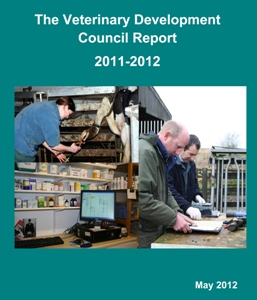Mapping a brighter future for vets in the food chain
Release Date 04 May 2012

A Reading scientist has played a key role setting out how the British veterinary profession should adapt to keep pace with changes in the food and farming sector.
Professor Richard Bennett, Professor of Agricultural Economics at the University of Reading, chaired the multi-stakeholder Veterinary Development Council (VDC), which published its report today (May 4, 2012) setting out practical ways to help the veterinary profession meet the demands of the UK food sector in the future.
Chaired by Professor Bennett, the council brought together representatives from across the whole food supply chain for the first time: veterinary surgeons, regulators, government, producers, processors, retailers, promoters, the veterinary schools, and the veterinary pharmaceutical industry, following a recommendation in a 2009 government report.
Amongst its eleven key recommendations, the VDC has called for:
- Consultation with vets about the possibility of allowing technicians, rather than fully-qualified vets, to carry out activities such as blood sampling and testing for disease
- More business education in UK veterinary schools and better training, consultancy and mentoring for vets to think strategically about how their businesses operate
- More emphasis among trainee vets to be given on their role in helping to supply high quality and safe food
- Consideration should be given by government to establish a Farm Animal Health and Welfare Stewardship Programme - similar to the environmental stewardship schemes currently run under European agricultural policy.
Professor Bennett said: "The veterinary profession has a key and changing role to play in the provision of high quality, safe, nutritious and affordable food for the population and in protecting the health and welfare of farm animals. There are many demands on the veterinarian from the food supply chain and an increasing challenge to adapt the provision of veterinary services to meet those demands as effectively and efficiently as possible.
"The aim of the VDC has been to identify practical ways in which this adaptation by the veterinary profession might be supported. We look forward to seeing how the BVA and other stakeholders respond to our recommendations, and how consideration of the future development of the provision of veterinary services is taken forward."
ENDS
For more details or interview requests, contact Pete Castle at the University of Reading press office on 0118 378 7391 or p.castle@reading.ac.uk or the BVA Media Office on 020 7908 6340 or media@bva.co.uk.
Notes to editors
The University of Reading is ranked among the top 1% of universities in the world (THE World University Rankings 2011-12), is among the top 20 universities in the UK for research funding, and is rated by students as having the joint best campus environment in the UK (THE Student Experience Survey).
The full report is available online here and further information on the VDC (including membership, meetings and presentations) is available here.
Funding for the independent chairman was provided by Defra and BVA provided the secretariat and administration. ‘Unlocking Potential: A report on veterinary expertise in food animal production' is available via the Defra website.
